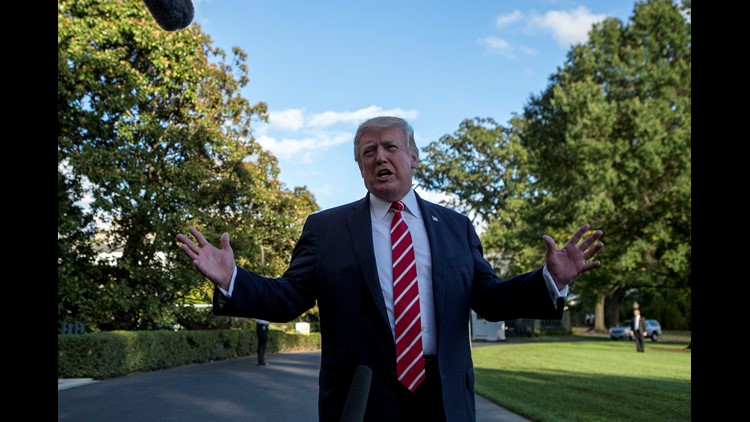President Trump gave out fake news "awards" to six news organizations Wednesday night, capping a much-hyped social media spectacle that matched Trump's penchant for showmanship with his disdain for the news media covering it.
None of the recipients of Trump's backhanded laurels were surprising: They've been frequent targets of the president's scorn for much of his first year in office. Among the news organizations cited: CNN, The New York Times, The Washington Post, ABC News, Newsweek and Time Magazine.
Most of the stories cited were verifiably false: ABC News retracted its report about former National Security Adviser Michael Flynn's testimony in the Russian collusion probe, and suspended correspondent Brian Ross. A report from a Time reporter about a missing Martin Luther King Jr. bust in the Oval Office on inauguration day was quickly corrected. And CNN admitted an error in dates that caused it to report that Donald Trump Jr. had access to leaked Democratic emails before they were posted on the website Wikileaks.
But the top example of "fake news" was actually an opinion piece from New York Times columnist Paul Krugman predicting stock market losses after Trump's election victory. Instead, the markets have boomed.
The media critic-in-chief also cited coverage of the investigation into Russian interference in the 2016 presidential campaign, which has focused on whether the Trump campaign colluded with agents of the Russian government.
"Russian collusion is perhaps the greatest hoax perpetrated on the American people," Trump said.
But a special counsel investigation led by former FBI Director Robert Mueller has already led to indictments or convictions of at least four people, including Flynn. There's been no publicly released evidence that Trump knew about his campaign's contacts with the Russians.
The very term "fake news" came out of Russian attempts to interfere with the election by — among other tactics — planting false stories on social media. But Trump quickly co-opted the term "fake news" to refer to stories that portrayed him in a negative light. But unlike the original meaning of fake news, the stories cited by Trump Wednesday weren't deliberately falsified — even if the reporting relied on false information.
The rollout of the awards didn't go smoothly. The awards were delayed nine days because, Trump said, "the interest in, and importance of, these awards is far greater than anyone could have anticipated!"
They were expected to come at 5 p.m. ET Thursday, but Trump posted a link to the awards on Twitter three hours later.
Then a series of website errors, presumably from high traffic volume, prevented most people from seeing the post until nearly half an hour later. They were hosted not on the White House website but the Republican National Committee's.
Despite some very corrupt and dishonest media coverage, there are many great reporters I respect and lots of GOOD NEWS for the American people to be proud of!
— Donald J. Trump (@realDonaldTrump) January 18, 2018
"Despite some very corrupt and dishonest media coverage, there are many great reporters I respect and lots of GOOD NEWS for the American people to be proud of!" Trump said. "ISIS is in retreat, our economy is booming, investments and jobs are pouring back into the country, and so much more! Together there is nothing we can’t overcome — even a very biased media. We ARE Making America Great Again!"
As Trump hyped the event, a growing number of bipartisan lawmakers, First Amendment groups and others rebuked the president.
"When a figure in power reflexively calls any press that doesn’t suit him 'fake news,' it is that person who should be the figure of suspicion, not the press," Sen. Jeff Flake, R-Ariz., said in a speech on the Senate floor Wednesday.
Sen. John McCain, R-Ariz., wrote in an op-ed for The Washington Post that Trump's anti-press rhetoric was giving cover to repressive regimes around the world.
"The phrase 'fake news' — granted legitimacy by an American president — is being used by autocrats to silence reporters, undermine political opponents, stave off media scrutiny and mislead citizens," McCain said.
Follow Gregory Korte on Twitter: @gregorykorte



